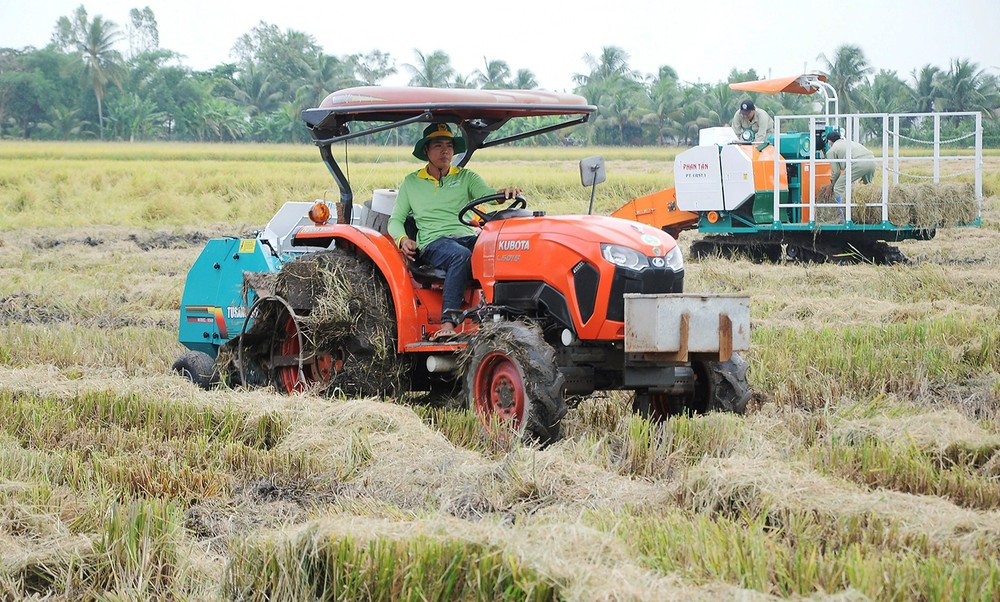Farmers, businesses pin hopes on high-quality rice fields
Society – Economy - Ngày đăng : 15:30, 06/06/2024
Farmers, businesses pin hopes on high-quality rice fields
Farmers and businesses in the Mekong Delta are pinning their hopes on the first one million hectares specializing in high-quality, low emission rice cultivation.

Agricultural officials have been visiting rice fields twice a week to inspect and provide careful recommendations, said Director Nguyen Cao Khai of Thuan Tien Agricultural Service Cooperative in the Mekong Delta City of Can Tho’s Vinh Thanh District. Cooperative members have been keeping daily logs of each task involved in the rice production process.
This has been the routine for the past two months in Thuan Tien village in Vinh Thanh District of Can Tho City, which has been selected as a pilot project to kickstart the implementation of the one million hectare high-quality rice project with low emissions linked to green growth in the Mekong Delta (abbreviated as the Project).
Can Tho City, along with Tra Vinh, Soc Trang, Kien Giang, and Dong Thap, are the five localities which were selected for the pilot implementation of the Project. According to members of Thuan Tien Cooperative, farmers in the area are very happy to receive support for seeds and 50 percent of fertilizer costs to carry out the Project. The OM 5451 rice variety grown by the cooperative members has already started to flower. Even better, a company has promised to buy rice at a price which is VND300 a kg higher than the market price.
Farmers working on the pilot fields were provided with certified seeds and trained to apply alternate wetting and drying (AWD) water-saving technology, site-specific nutrient management (SSNM), and machine-sown rows combined with fertilizer application. All stages are carried out mechanically. Participating farmers are also proficient in pest management using Integrated Pest Management (IPM) methods.
Furthermore, when the rice is ripe, they use combine harvesters to harvest and collect straw from the fields to make straw mushrooms and straw fertilizer.
Like many localities in the Mekong Delta, from 2016 to 2022, Can Tho City had 32,000 farmers participating in the VnSAT project with an area of 38,000 ha. In the past, the average seed rice sowing rate for farmers in the Mekong Delta was around 100-150kg per ha. However, when implementing the project, it was only 60kg a ha. The amount of fertilizer and pesticides have been also reduced, plus less loss after harvest. Farmers are now used to writing field diaries, said Mr. Nguyen Cao Khai.
According to Vice Chairman Nguyen Ngoc He of the People's Committee of Can Tho City, the city has high expectations and is committed to making efforts to successfully implement the Project. The city is striving to build a specialized high-quality rice production area with a scale of 38,000 ha by 2025, and 50,000 ha from 2026 to 2030.
Deputy Director Le Thanh Tung of the Department of Cultivation under the Ministry of Agriculture and Rural Development said that the Project is not only purely technical but also aims to improve the infrastructure for production towards reorganizing the entire rice sector in the Mekong Delta to reduce production costs, increase rice grain value, reducing emissions and developing sustainable rural areas.
The project aims to form cooperatives, and farmer organizations as well as establish close links with businesses to consume rice at a higher value level to increase farmers' incomes.
Currently, Can Tho City, Soc Trang Province and Dong Thap Province have all chosen cooperatives to start the Project.
Deputy Minister Tran Thanh Nam of Agriculture and Rural Development said that the success of the Project to sustainably develop 1 million hectares of specialized high-quality and low-emission rice cultivation linked to green growth in the Mekong Delta depends on cooperatives. Therefore, the Ministry of Agriculture and Rural Development has also formulated a plan to enhance the capacity of partners and agricultural cooperatives to develop value chain linkages to implement the Project.
As per the plan, in the period of 2024-2025, the training and capacity building will be completed for 3,100 management and technical staff of 620 agricultural cooperatives which registered to participate in the Project and 3,000 agricultural extension officers who communicate to farmers about agricultural information on natural resources, animals, crops, on how best to utilize the farmland, how to construct proper irrigation schemes, economic use, and storage of water, how to combat animal disease and save on the cost of farming equipment and procedures.
Also in this period, roughly 200,000 farmers will be trained on sustainable rice production practices, emission reduction linked to green growth, and skills to register and assess emission reduction at the household level. The training aims to enhance the capacity of agricultural cooperatives, farmers and other stakeholders involved in the high-quality, low-emission rice value chain.
Director Nguyen Cao Khai hopes that the linkage between farmers and businesses will be closer. Businesses fulfill their commitments to purchase rice so that farmers will have more motivation to expand the area under the Project.
